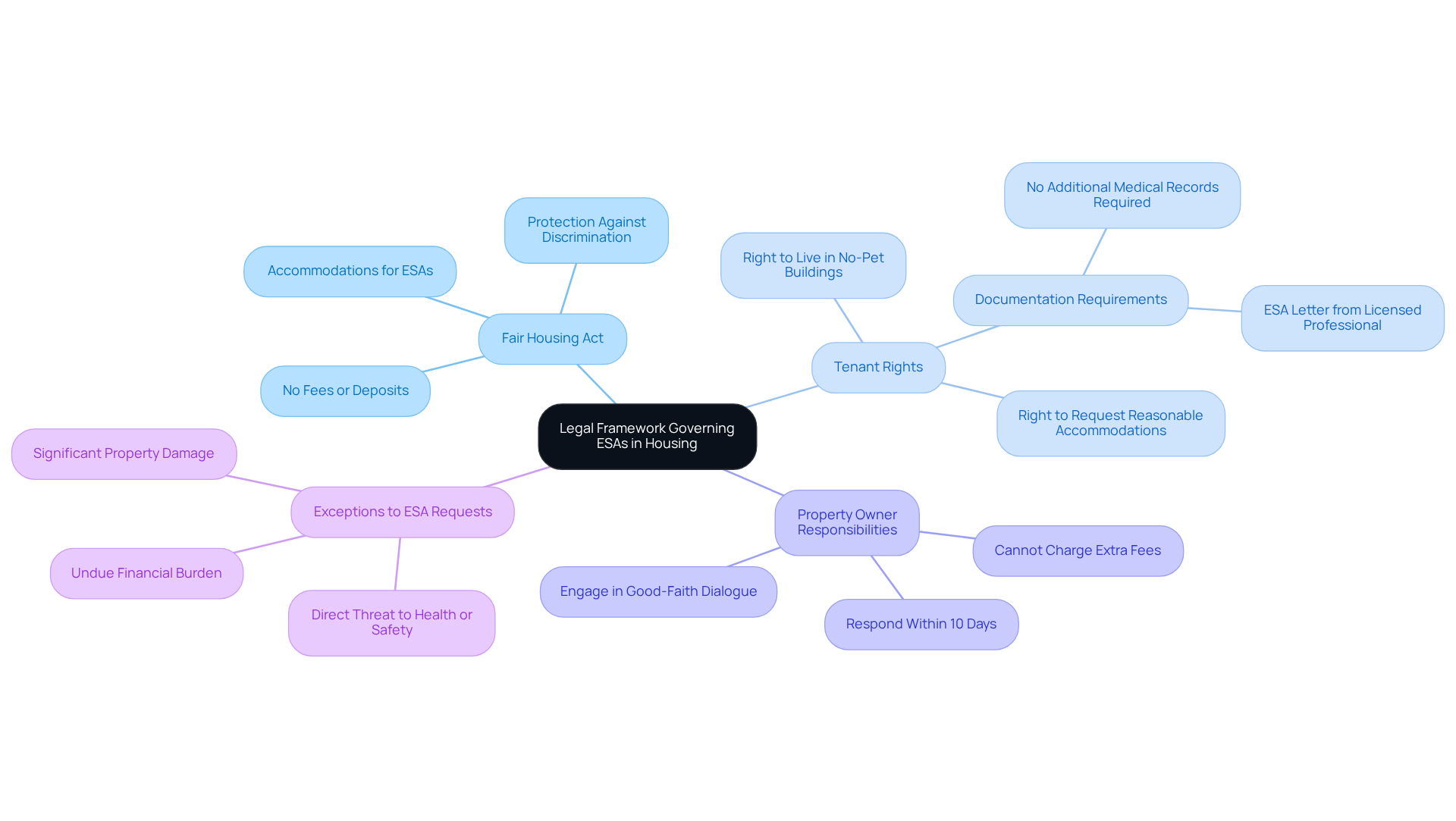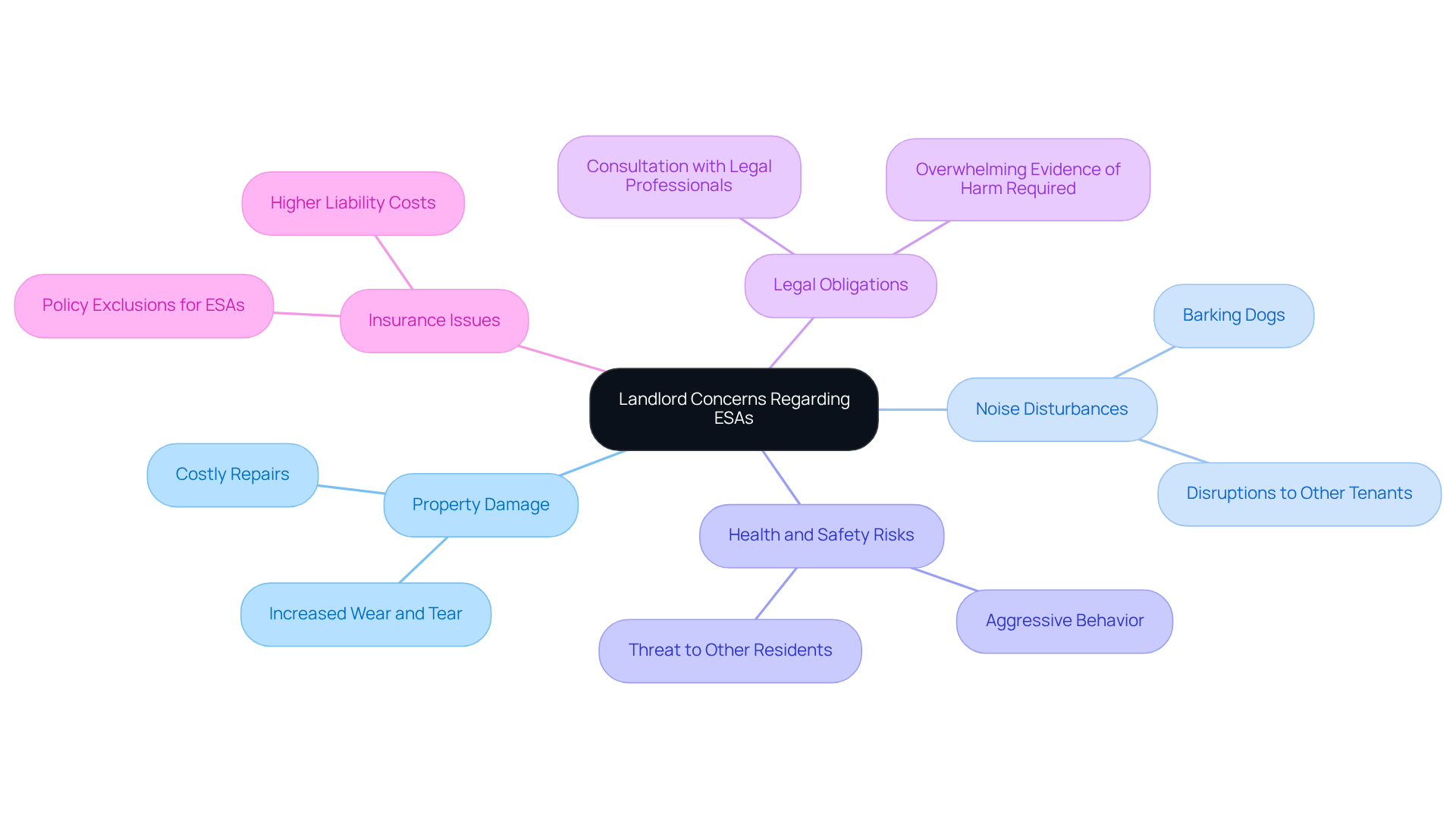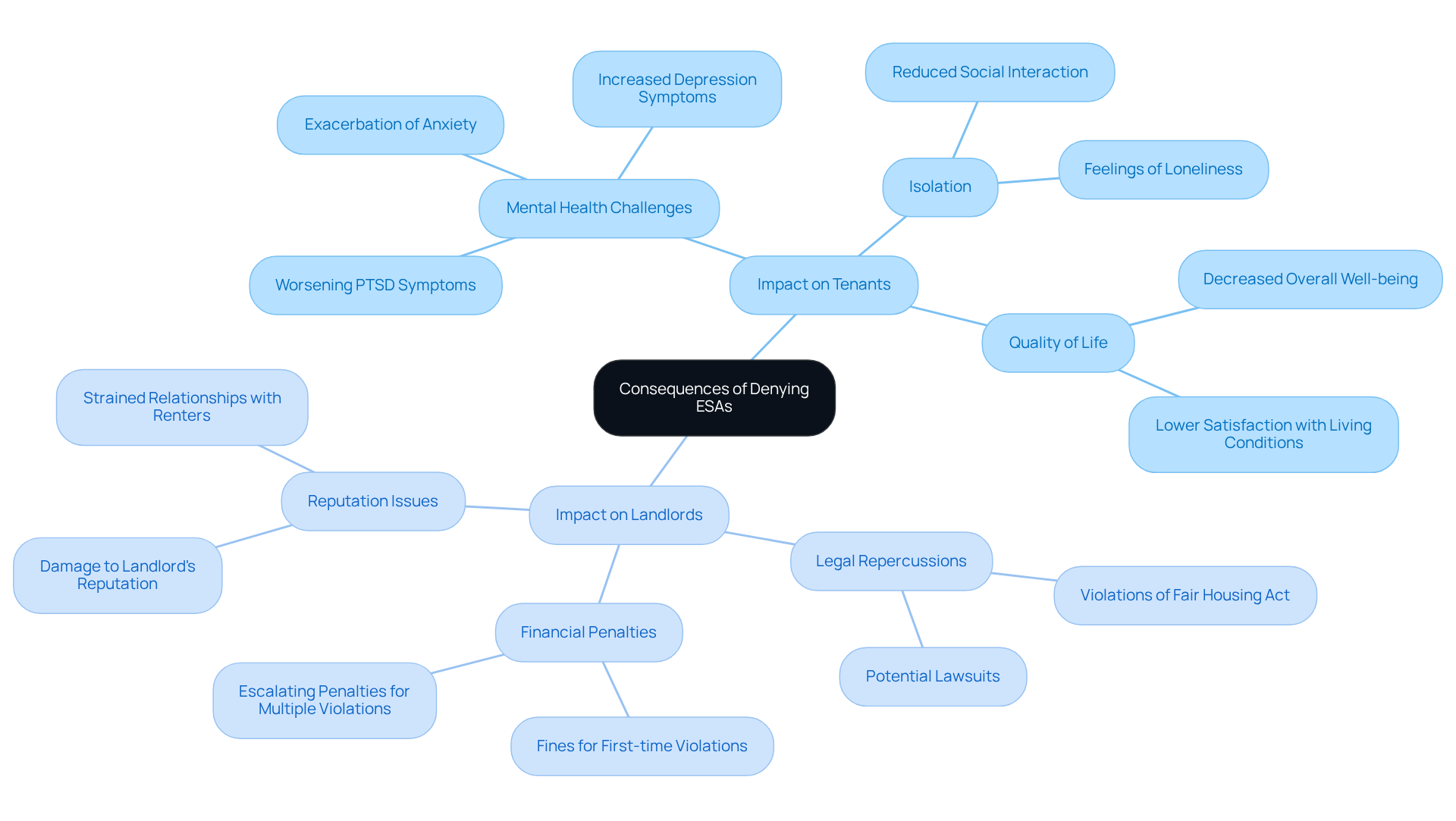

Why Can Apartments Deny ESA: Legal and Practical Insights
by Lena Park
Last updated: August 6, 2025
Verified and Approved by:
Angela Morris,
MSW, LCSW
Fact Checked

Overview
Navigating the world of housing can be particularly challenging for individuals with emotional support animals (ESAs). It’s important to recognize the emotional toll that mental health issues can take, and the comfort that an ESA can provide. However, apartments can legally deny ESAs under certain circumstances. For instance:
- If the animal poses a direct threat to health or safety,
- Causes significant property damage,
- Imposes an undue financial burden on the property owner.
A denial may occur in these situations. This can feel disheartening, especially when the bond with an ESA is so vital for emotional well-being.
The Fair Housing Act is designed to support individuals with ESAs, mandating accommodations while also outlining specific exceptions that allow for denial. This legal framework can be complex, and it’s crucial for tenants and landlords to engage in effective communication to navigate these challenges. Understanding these nuances can help alleviate some anxiety surrounding the situation.
If you find yourself facing difficulties in securing housing with your ESA, know that there are supportive solutions available. An ESA letter can serve as a valuable tool in advocating for your needs. It not only highlights the importance of your animal in your emotional journey but also fosters a sense of connection and understanding with landlords. You’re not alone in this process; there are resources and support systems in place to help you advocate for your rights and the companionship that your ESA provides.
Introduction
Navigating the complexities of emotional support animals (ESAs) in housing can be overwhelming, as it reveals a landscape filled with legal intricacies and practical challenges. Many individuals with mental health issues face significant struggles, and while the Fair Housing Act mandates accommodations for those with disabilities, there are specific scenarios where apartments can legally deny ESA requests. This raises important questions about tenant rights and landlord responsibilities.
What happens when the deep need for emotional support collides with property owners’ concerns over safety, liability, and potential damage? Understanding this delicate balance is crucial for both tenants seeking companionship and landlords striving to maintain a harmonious living environment.
It’s essential to recognize that behind every ESA request lies a personal journey, and the emotional support that these animals provide can be transformative. By addressing these concerns with compassion and clarity, we can foster a more supportive environment for everyone involved.
Examine Legal Framework Governing ESAs in Housing
Navigating the legal framework surrounding emotional support animals (ESAs) in housing can be daunting for individuals facing mental health challenges. The Fair Housing Act (FHA) aims to provide support by requiring property owners to accommodate residents with disabilities who need ESAs. This means that, generally, property owners cannot refuse a tenant’s request for an ESA if they present valid documentation from a licensed mental health professional.
However, it’s important to recognize that there are specific circumstances in which apartments can deny ESA requests legally. These include scenarios where:
- The animal poses a direct threat to the health or safety of others.
- The animal causes significant property damage.
- Accommodating the ESA would impose an undue financial burden on the property owner.
It’s crucial to note that property owners are not permitted to charge fees or deposits for emotional support animals, which directly impacts the rights of renters seeking companionship and comfort. Furthermore, property owners are required to respond within 10 days of receiving an ESA letter from a renter, ensuring timely communication.
Understanding these legal nuances is essential for both individuals requesting ESAs and property owners fulfilling their responsibilities under the law. Reflecting on recent statistics, it’s evident that approximately 60% of complaints against housing providers relate to disability access and the refusal of reasonable accommodations. This underscores the importance of fostering effective communication between residents and landlords.
By engaging in positive discussions, both parties can work towards suitable arrangements that comply with FHA regulations, ensuring equitable treatment for tenants who rely on the emotional support their pets provide. It’s through this compassionate dialogue that we can truly address the needs and concerns of those seeking the comfort of an ESA.

Analyze Practical Concerns for Landlords Regarding ESAs
Landlords often face significant challenges when considering if apartments can deny ESA requests for emotional support animals (ESAs) in their properties. One major concern is the potential for property damage; many property owners worry that ESAs might lead to increased wear and tear, resulting in costly repairs. For example, damage from scratching or chewing can necessitate substantial restoration efforts. Additionally, noise disturbances are a common worry, particularly with dogs that may bark or create disruptions, affecting the peace of other tenants.
Health and safety risks weigh heavily on property owners’ minds as well. They may fear that an ESA could pose a threat to other residents, especially if there is any indication of aggressive behavior in the animal’s history. This concern is compounded by the legal landscape, as property owners must navigate whether apartments can deny ESA requests while accommodating tenants with legitimate ESA letters and protecting the well-being of their property and other tenants. Importantly, property owners must understand that apartments can deny ESA requests only with overwhelming evidence of harm, reinforcing their legal obligations.
Insurance policies add another layer of complexity to the situation. Many property owners encounter higher liability insurance expenses or may discover that their policies do not cover damages or liabilities related to ESAs. This financial burden can lead to hesitance in approving ESA requests, despite the legal requirement to do so. Emotional support animals are not classified as pets and are exempt from community regulations concerning restricted breeds and weight limits, which can further complicate liability insurance issues for property owners.
Ultimately, while property owners must navigate these practical concerns, they are also encouraged to consult with their insurance providers and familiarize themselves with the legal protections available to individuals requiring emotional support animals. This proactive approach can help mitigate risks while ensuring compliance with fair housing laws. Additionally, the affordability of obtaining ESA documentation, with flexible payment plans starting as low as $32.25, can help alleviate concerns about potential fraudulent requests.

Explore Consequences of Denying ESAs for Tenants and Landlords
The question of whether can apartments deny esa highlights the significant repercussions that refusing an emotional support animal (ESA) can have for both residents and property owners. For residents, the absence of an ESA can severely exacerbate mental health challenges, as these animals often serve as vital sources of emotional support for individuals grappling with anxiety, depression, or PTSD. Research shows that individuals who lack access to their ESAs may experience intensified symptoms of their mental health conditions. The New Jersey Supreme Court ruling in March 2024 reaffirmed the crucial role of ESAs in assisting those with mental health issues, highlighting their importance in therapeutic contexts. The question of whether can apartments deny esa is important, as denying an ESA can result in increased feelings of isolation and distress, ultimately impacting their overall well-being and quality of life.
Conversely, property owners who unjustifiably deny ESA requests may question if can apartments deny esa, as they may face serious legal repercussions. Violating the Fair Housing Act can lead to lawsuits or fines, with penalties for first-time violations reaching up to $10,000 and escalating to $50,000 for multiple infractions within five years. Such legal challenges not only incur financial burdens but can also tarnish a property owner’s reputation and strain relationships with renters, creating a tense rental atmosphere. Recent cases have underscored property owners facing legal action for failing to accommodate individuals’ ESA requests, leading to the question of can apartments deny esa, and emphasizing the need for a proper understanding and compliance with housing laws. It is wise for property owners to seek legal counsel before taking action against residents with assistance animals, ensuring they navigate these complexities effectively.
Navigating the intricacies of ESA requests requires an awareness of these potential consequences. Both tenants and landlords must recognize the essential role ESAs play in supporting mental health, as well as the legal obligations that govern their presence in rental properties. In summary, understanding the implications of denying ESAs is crucial for fostering a supportive and legally compliant rental environment.

Conclusion
Understanding the complexities surrounding emotional support animals (ESAs) in housing is vital for both tenants and landlords. Many individuals face emotional challenges that can significantly impact their well-being, and ESAs can play a crucial role in providing the support they need. While the Fair Housing Act mandates that property owners accommodate residents with legitimate ESA requests, it is important to recognize that there are specific legal grounds on which apartments can deny these requests. This balance between legal obligations and practical concerns is essential for fostering a respectful and equitable rental environment.
Key arguments highlighted throughout this discussion include:
- The legal framework that protects tenants’ rights while also considering landlords’ concerns about property damage, safety, and insurance implications.
- The understanding that landlords may have worries, but open communication between both parties can lead to mutually beneficial arrangements that comply with the law.
- The potential consequences of denying ESAs for both tenants and landlords illustrate the importance of understanding these dynamics, as unjustified refusals can lead to legal repercussions.
Ultimately, fostering an inclusive and supportive housing environment requires awareness of the pivotal role ESAs play in the mental health of individuals. By prioritizing dialogue and understanding, both landlords and tenants can navigate the challenges associated with ESAs more effectively. A proactive approach to compliance with the Fair Housing Act, coupled with a willingness to engage in constructive discussions, can help ensure that the needs of all parties are met. This not only promotes a healthier living situation for everyone involved but also nurtures a sense of community and support that is so vital in today’s world.
Frequently Asked Questions
What is the legal framework governing emotional support animals (ESAs) in housing?
The legal framework is primarily established by the Fair Housing Act (FHA), which requires property owners to accommodate residents with disabilities who need ESAs.
Can property owners refuse a tenant’s request for an ESA?
Generally, property owners cannot refuse a tenant’s request for an ESA if they present valid documentation from a licensed mental health professional. However, there are specific circumstances under which requests can be legally denied.
What are the circumstances in which an ESA request can be denied?
An ESA request can be denied if: the animal poses a direct threat to the health or safety of others, the animal causes significant property damage, or accommodating the ESA would impose an undue financial burden on the property owner.
Are property owners allowed to charge fees or deposits for emotional support animals?
No, property owners are not permitted to charge fees or deposits for emotional support animals.
How quickly must property owners respond to an ESA request?
Property owners are required to respond within 10 days of receiving an ESA letter from a renter.
Why is understanding the legal nuances surrounding ESAs important?
Understanding these nuances is essential for both individuals requesting ESAs and property owners to ensure compliance with the law and to foster effective communication regarding reasonable accommodations.
What percentage of complaints against housing providers relate to disability access and refusal of reasonable accommodations?
Approximately 60% of complaints against housing providers relate to disability access and the refusal of reasonable accommodations.
How can residents and landlords work together regarding ESAs?
By engaging in positive discussions, both parties can work towards suitable arrangements that comply with FHA regulations, ensuring equitable treatment for tenants relying on emotional support from their pets.
Certify Your Emotional Support Animal Today

Why You Can Rely on Us?
At Wellness Wag, we believe your pet deserves care rooted in both science and compassion. Each article is carefully researched, written in clear language for pet owners, and then reviewed by qualified professionals to ensure the information is evidence-based, current, and practical for real-life care. Our goal is to help you feel confident in making informed decisions about your pet’s health and well-being.
Reviewed by
Angela Morris, MSW, LCSW
Angela is a licensed clinical social worker with 20 years of experience in patient advocacy and community mental health. She has assisted numerous clients with ESA evaluations and brings a deep understanding of disability accommodations, ensuring that all information is accurate, supportive, and practical.

Written by :
Lena Park
Last Updated :
August 6, 2025












